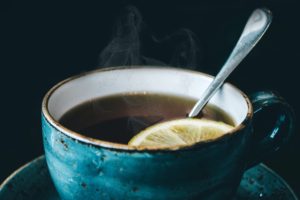PCOS, or polycystic ovarian syndrome, is a metabolic and hormonal disorder that affects levels of insulin, cortisol, testosterone, and other hormones. It is often described as an anovulatory disorder, meaning most women with PCOS do not ovulate regularly. Hormonal abnormalities can prevent the egg from maturing properly and will sometimes release the egg too early, too late, or not at all. This irregular or lack of ovulation creates difficulty in timing pregnancies or getting pregnant at all. It is the most common reason for infertility in women. Missed periods or very irregular periods due to this roller coaster of hormones causes even more stress and inflammation in the body. In addition, if the follicle doesn’t release at all, they may turn into little fluid filled sacs called cysts. These cysts make androgens which prevent ovulation and increases insulin resistance. This insulin resistance creates further disruption of hormones.
The cycle continues. It seems difficult to break the cycle.
But there is hope.
Six Ways to break the PCOS cycle
- Get acupuncture – acupuncture calms the sympathetic nervous system, the fight or flight part of the nervous system that responds to stress. Reducing stress in the body will reduce inflammation. Acupuncture also helps regulate hormones, including LH, FSH, and testosterone, allowing for normal ovulation. It brings blood flow and circulation to the uterus to help regulate menses. Studies have shown that up to 1/3 of women with PCOS treated with acupuncture begin to ovulate again.
- Move your body – When the body is resistant to insulin, blood sugar levels rise. As the blood sugar levels rise, it becomes more difficult to maintain a healthy weight. For up to 48 hrs after exercise, the body is more sensitive to insulin. Even though there is debate on what kind of exercise is best for insulin resistance, both aerobic and resistance exercise can induce improvements. Weight loss isn’t always the goal with exercise but with PCOS, weight loss of only 5-10% of body weight has been shown to restore ovulation. Adipose tissue acts as an endocrine organ which secretes metabolic hormones such as leptin. Leptin controls appetite and satiety. With excess adipose, more leptin is released and eventually becomes ignored by the body. It becomes a sort of leptin resistance similar to insulin resistance. Leptin resistance is associated with placenta issues and poor egg quality. It is also responsible for stimulating the hypothalamic–pituitary–adrenal axis (HPA axis) and releasing more GH-releasing hormone (GHRH) and luteinizing hormones (LH). Reducing body fat reduces the leptin levels and essentially causes the body to notice it again. Exercising regularly can lower body fat, reduce insulin resistance, and lower LH levels. Bottom line: Move your body in whatever way you can!
- Eat Foods to Clear Damp/Phlegm – In Chinese Medicine, PCOS has a damp component, especially for those who have cystic acne. It is important to eat foods to reduce the accumulation of dampness or excess fluid in the body. Avoid dairy, rich fatty meats, peanuts, especially peanut butter, fruit juices, bananas, sugar/sweeteners, and refined wheat products. Foods to add to your diet which help clear the damp are:
- Corn, barley, rice
- Mushrooms, pumpkin, radish, daikon, seaweed
- papaya, lemon, orange peel, grapefruit
- almonds, walnuts
- lentils, kidney beans
- blueberry, cranberry
- asparagus, celery, cabbage
- basil, parsley, oregano, marjoram, nettle
- garlic, onions, horseradish
- green, jasmine, and raspberry leaf tea
- Add supplements – N-acetyl-cysteine (NAC) is an amino acid precursor to glutathione, an antioxidant. It reduces circulating testosterone and insulin, as well as cholesterol. NAC is sometimes included in a multivitamin or you can get a supplement like Nutrient 950 with NAC by Pure Encapsulation. Inositol is a type of sugar that positively influences hormones and insulin. In PCOS, there is a deficiency of myo-inositol (MI) which is a precursor to d-chiro-inositol (DCI). It is a phenomenal supplement to help reduce androgen levels, help restore ovulatory function, lower blood pressure, and decrease triglyceride levels. My two favorite supplements for insulin resistance are Sensitol by Designs for Health and Ovasitol by Theralogix. Add the following foods to your diet which also contain inositol:
- fruits, especially oranges and cantaloupe
- beans
- grains
- nuts
- oats
- bran

photo by @lisafotios
- Drink Spearmint Tea – Studies have shown that drinking a cup of spearmint tea 2x/day can decrease testosterone. Decreasing testosterone has a strong effect on unwanted hair as well as curbing the hormone cycles preventing ovulation. All in all, this is one of the easiest way to cause a strong shift in hormones.
- Reduce/Eliminate Endocrine-Disrupting Chemicals – There are many chemicals in our environment today that affect our endocrine system. For women with PCOS, xenoestrogens can be particularly problematic. These chemicals mimic estrogen in the body and can block the real estrogen from doing its work. Xenoestrogens are a prime cause of hormone imbalance. Dioxins are toxic chemicals created as by-products of many industrial processes. They have been linked to an increased risk of endometriosis and irregular menstrual cycles. They are found mainly in the fatty tissue of animals. Be sure to buy organic and low fat as much as possible and limit consumption of beef, dairy products, and eggs . Other chemicals that can disrupt the endocrine are:
- Nicotine
- BPA (in plastics)
- Phthalates (in plastics)
- Triclocarbans (in antimicrobial soap)
Small steps can make a difference with PCOS. And remember that small steps over time equal big steps! You can break the cycle!
